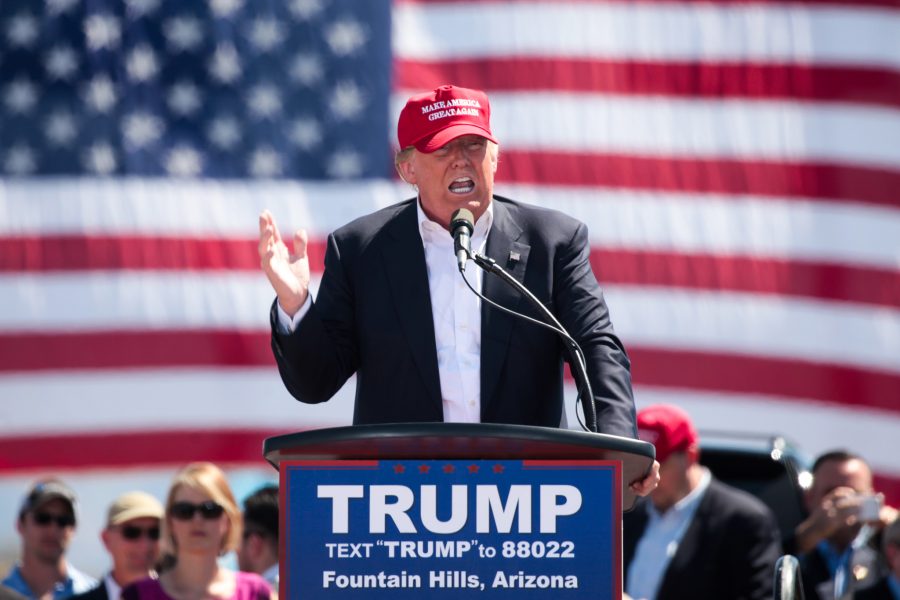Trump elected President in a surprise finish capping an unforgettable campaign
Now President-Elect Donald Trump speaks at a rally in Fountain Hills, Ariz. Trump’s victory over Hillary Clinton was in conflict with the vast majority of polling predictions. Photo credit: Gage Skidmore
November 9, 2016
Defying expectations, polling predictions and at times the will of his own party establishment, Donald Trump has won the election to be the next President of the United States of America.
Trump addressed a roaring crowd of supporters at a rally in New York, promising to serve the disenfranchised and praising the grassroots efforts by his supporters.
“The forgotten men and women of our country will be forgotten no longer,” Trump said in a video on the New York Times website. “As I’ve said from the beginning, ours was not a campaign, but rather an incredible and great movement made up of millions of hard-working men and women who love their country and want a better, brighter future for themselves and for their families.”
Trump’s campaign, who spread the message of securing the borders, renegotiating our trade deals and generally making America great again, hit home with a growing number of Americans who are concerned about the impact of globalization.
As polls opened Tuesday morning, the opinion analysis site FiveThirtyEight, which has an almost perfect record predicting election outcomes since 2008, forecasted Trump’s chances of winning at 28.6 percent with Clinton’s chances at 71.4 percent. This forecast was based on aggregating data from dozens of national polls. By 8 p.m. PST, the New York Times was reporting Trump’s odds of winning at greater than 95 percent.
Just before 12 a.m. PST Wednesday morning, media companies had begun to announce that Trump has been elected the 45th president of the United States after winning a majority of 279 electoral votes. By early Wednesday morning, Hillary Clinton had conceded the election to Trump.
Displaying shades of Brexit, the Trump campaign has defied the polling predictions while capitalizing on the mistrust of globalization and immigration and ridding the White House of the elite politicians. Trump’s populist message of bringing jobs back to the United States by restructuring our trade policy and establishing new immigration controls seems to have resonated with the electorate.
Throughout Trump’s campaign, many leading Republican figures refused to endorse him and some, including Mitt Romney and Jeb Bush, even spoke out against him. Speaker of the House Paul Ryan said, after the audio tape was released of Trump making lewd comments about women, that he could no longer defend Trump. However, this lack of support from established party figures didn’t seem to have an effect on Trump’s support.
Instead, Trump’s campaign capitalized on the party’s rejection of him, running as an anti-establishment outsider, which was exactly what so many voters were looking for. Aside from being a selection of Trump, in many ways this election was a rejection of established party politics and the political status quo. However, Trump pledged during his victory speech to work with those who denied him during his campaign.
“For those who have chosen not to support me in the past, of which there were a few people, I’m reaching out to you for your guidance and your help so that we can work together and unify our great country,” Trump said.
In addition to securing the White House, the Republican party has won control of both houses of Congress. While the Republicans lost one seat in the Senate and possibly 10 seats in the House of Representatives, they still maintain a majority in both chambers.
In California’s Senate race, Kamala Harris (D) lived up to expectations, securing the Senate seat left vacant by Barbara Boxer (D) who resigned after serving four terms in office. Harris defeated her Democratic opponent Loretta Sanchez (D) by a 2 to 1 margin. Harris previously served as the Attorney General for California since 2010 and ran on a platform of education and criminal justice reform. Harris will be the first African American Senator to represent California and the second African American women to be elected into the Senate.
California’s ballot propositions largely followed expectations with voters passing the school bond measure Proposition 51, marijuana legalization Proposition 64, and parole for nonviolent offenders Proposition 57. While voters rejected the prescription drug price control measure Proposition 61. Voters also elected to keep the death penalty in California, increase the tax on tobacco products and increase screening and limitations for purchasing ammunition.
The newly elected members of Congress will begin serving in office when the next congressional session begins on Jan. 3, 2017. President-elect Trump will be inaugurated and take office Jan. 20, 2017.






